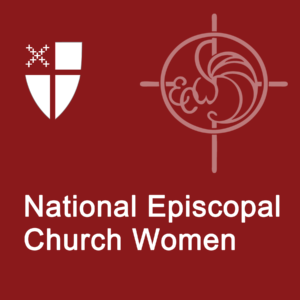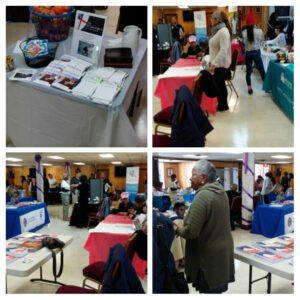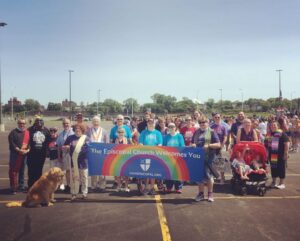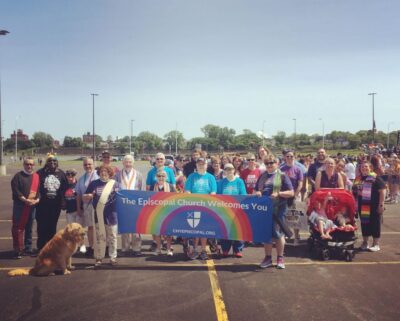Sanadores en el nombre de Cristo
 Escrito por Rick Stanitis
Escrito por Rick Stanitis
Otorga, Oh Señor, que el Santísimo Espíritu de Vida pueda mover cada corazón humano de tal forma que ninguna barrera pueda dividirnos, que las sospechas desaparezcan, y el odio cese; que nuestras divisiones sean sanadas y así vivir en justicia y paz; por Cristo, nuestro Señor. Amen.
La rama Episcopal del movimiento de Jesus, mayordomos que soñamos y trabajamos para fomentar comunidades amorosas donde todas las personas pueden experimentar dignidad y vida en abundancia y considerarse a sí mismos y al prójimo hijos amados de Dios.
Hay mucho entusiasmo entre las personas de la Provincia V para educar y transformarse en una comunidad amorosa. En la diócesis y comunidades, individuos se esmeran en el trabajo transformador de formar una identidad como seguidores de Jesucristo. En nuestro pacto bautismal, nosotros profesamos que alcanzaremos la justicia y la paz entre las personas, y respetamos la dignidad de cada ser humano. Yo siempre reflexiono sobre esta promesa mientras avanzo en mi ministerio y mi vida. Es este el pacto que yo siento que enmarca nuestro proceso en convertirnos en una comunidad amorosa. Los comités, grupos de fe, círculos de práctica, comunidades y redes se reúnen regularmente a lo largo de la provincia con el propósito principal de informar y educar a los miembros de la historia del racismo sistemático en el mundo.
Yo creo que la respuesta más común que escucho de personas que empiezan el proceso de concientización sobre el racismo en nuestra Sociedad es la siguiente: “No tenía idea de que eso estaba pasando y hasta qué punto. O, mi educación carecía de esta concientización.” Esta es una de las muchas razones por las que necesitamos estudiar, y discutir los efectos devastadores del racismo sistemático y trabajar duro para acabar con ello en todas sus formas. De la manera que lo veo, el aprendizaje en comunidades de apoyo está ocurriendo a lo largo de la provincia y es un paso importante para transformarnos en una comunidad amorosa.
El campo sagrado es una serie de diálogos sobre la raza diseñados para nuestros tiempos. Es un intento para responder a los profundos retos que existen actualmente en nuestra Sociedad. Se enfoca sobre los retos que desembocan de la raza y el racismo. También trata sobre el dialogo transformador que tenemos entre nosotros. Invita a los participantes a rememorar para ver las diversas etapas que nos han traído hasta acá, y lo hace de una manera personal, siempre reflexionando sobre las historias de familiares e historias, al igual que narrativas importantes que forman la historia colectiva americana. Mantiene la visión de una comunidad amorosa como guía.
Los círculos sagrados se están formando a lo largo de la provincia y están usando el currículo de la mejor manera para enmarcarse al contexto y las comunidades. Miembros de la provincia V se reúnen virtualmente. Estos grupos comparten experiencias ponderosas. Los entrenamientos tuvieron una asistencia mayoritaria y ofrecieron información útil. La esperanza es que estas sesiones den a la comunidad y sus líderes la confianza para organizar y facilitar círculos sagrados en sus comunidades y vecindarios. Los cursos de Círculos sagrados tienen excelentes videos de formación sobre tópicos para discutir. Yo creo que los círculos sagrados, al igual que los libros y otros videos, son la espina dorsal para transformar a la comunidad.
Otra parte critica de nuestro viaje para convertirnos en una comunidad amorosa es el acompañamiento. Nosotros necesitamos de otros mientras aprendemos y discutimos tópicos serios e importantes como estos. Para algunas personas, esta experiencia de que han estado desinformados por tanto tiempo es difícil de aceptar y discutirlo es esencial. Acá es donde la provincia V desmantela redes de racismo, lo cual es esencial. Este grupo comparte información y actividades a lo largo de provincias y está abierta a todos los individuos interesados en combatir el racismo sistemático. Otras provincias locales se reúnen y apoyan mutuamente y se aman mutuamente de la misma manera que nuestro Dios nos ama. Yo motivo a todos para que inicien su propia jornada en educar a los demos para terminar con el racismo.
Esto no es un programa o actividad por temporada que haces cuando te impelan a hacerlo. Este paradigma ha cambiado. Una nueva manera de ser, una manera de abrir nuestra mente y corazón al Espíritu de Dios. Convertirnos en una comunidad amorosa no es un trabajo que se consigue de la noche a la mañana o que es un requerimiento para un ministerio. Es una transformación andante que debemos abarcar en la más sutil y genuina de las maneras que podamos. Un cambio que viene del corazón y hará de nuestra comunidad un ambiente más abierto para los niños de Dios. Por ende, únete a un grupo, lee un libro, edúcate a ti mismo para acabar con el racismo sistemático. Depende de cada uno de nosotros el crear un mundo mejor para todos donde el racismo no destruya vidas. Se la persona que trae el cambio que da vida y trabaja para construir una comunidad más amorosa.
Juntos, crecemos como conciliadores, buscadores de justicia y sanadores en el nombre de Cristo.
Enviado por Jan Goossens
Representante de la provincia V, NECW

 Escrito por Janice N. Meyer, BA, MDiv
Escrito por Janice N. Meyer, BA, MDiv The Diocese of Colorado is a patchwork of communities, some diverse, some homogeneous. The diocese has many efforts aimed at loving, inclusive membership among all people. Many small, rural communities are mostly white, so the majority of the ministries of inclusion are in the large metropolitan area of Denver and its suburbs.
The Diocese of Colorado is a patchwork of communities, some diverse, some homogeneous. The diocese has many efforts aimed at loving, inclusive membership among all people. Many small, rural communities are mostly white, so the majority of the ministries of inclusion are in the large metropolitan area of Denver and its suburbs. “Uno, dos, tres, cuatro, ¡todos son bienvenidos!” Cantando, yo marche por primera vez, al lado de Episcopales y luteranos, en la Marcha del orgullo Gay llevada a cabo en Syracuse, Nueva York, el 16 de junio de 2018. Marchando sobre el área renovada de la ciudad, donde rebosaban pancartas del orgullo Gay, globos hacienda alusión a lo mismo, sombreros, y paraguas que fueron abundantemente visibles, y a la vez usados por los asistentes y el clero de diversas orientaciones sexuales, de ambas denominaciones. El Reverendo Peter Williams, rector de la iglesia de la Gracia y El Espíritu Santo en Cortland, New York, una congregación episcopal y luterana, fue el gran representante de la marcha del Orgullo Gay del 20218. Una gran Multitud de personas llenaban las calles que caminamos.
“Uno, dos, tres, cuatro, ¡todos son bienvenidos!” Cantando, yo marche por primera vez, al lado de Episcopales y luteranos, en la Marcha del orgullo Gay llevada a cabo en Syracuse, Nueva York, el 16 de junio de 2018. Marchando sobre el área renovada de la ciudad, donde rebosaban pancartas del orgullo Gay, globos hacienda alusión a lo mismo, sombreros, y paraguas que fueron abundantemente visibles, y a la vez usados por los asistentes y el clero de diversas orientaciones sexuales, de ambas denominaciones. El Reverendo Peter Williams, rector de la iglesia de la Gracia y El Espíritu Santo en Cortland, New York, una congregación episcopal y luterana, fue el gran representante de la marcha del Orgullo Gay del 20218. Una gran Multitud de personas llenaban las calles que caminamos. “One, two, three, four, all are welcome at our door!” Chanting and cheering, I marched for the first time along with Episcopalians and Lutherans in the CNY Pride annual parade held in Syracuse, New York on June 16, 2018. Parading through the newly revitalized Inner Harbor area of the city, rainbow banners and balloon arches, umbrellas, hats, and clergy stoles were abundantly visible, carried and worn by participating clergy and laypeople, of all sexual orientations, from both denominations. The Rev. Peter Williams, rector of Grace and Holy Spirit Church in Cortland, New York, an Episcopal/Lutheran congregation, was the grand marshal of the 2018 Pride Parade. A large crowd lined the streets we walked.
“One, two, three, four, all are welcome at our door!” Chanting and cheering, I marched for the first time along with Episcopalians and Lutherans in the CNY Pride annual parade held in Syracuse, New York on June 16, 2018. Parading through the newly revitalized Inner Harbor area of the city, rainbow banners and balloon arches, umbrellas, hats, and clergy stoles were abundantly visible, carried and worn by participating clergy and laypeople, of all sexual orientations, from both denominations. The Rev. Peter Williams, rector of Grace and Holy Spirit Church in Cortland, New York, an Episcopal/Lutheran congregation, was the grand marshal of the 2018 Pride Parade. A large crowd lined the streets we walked.